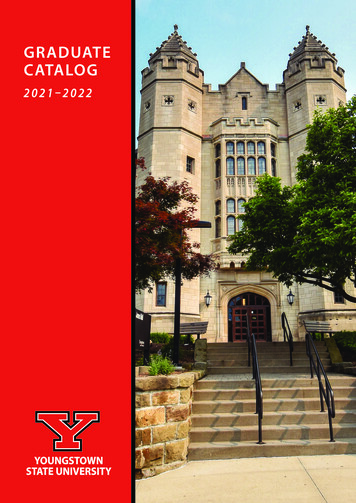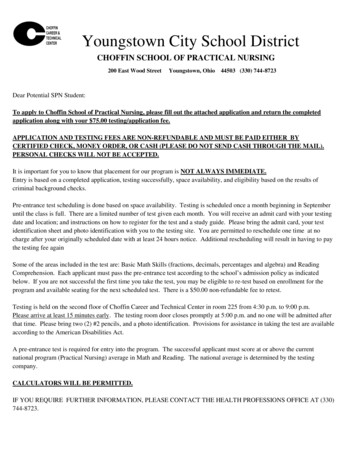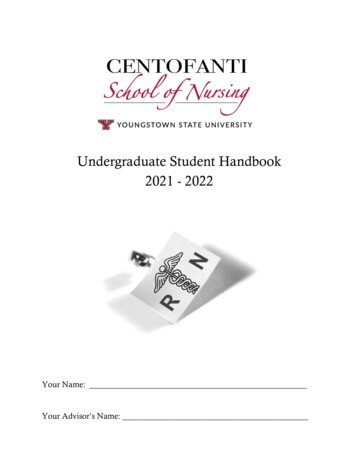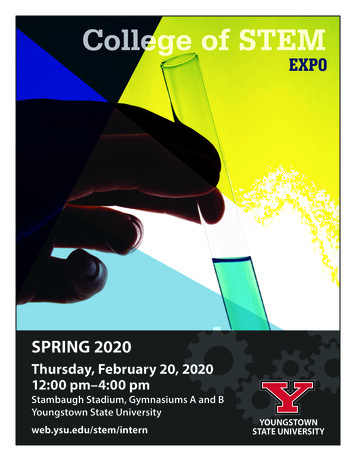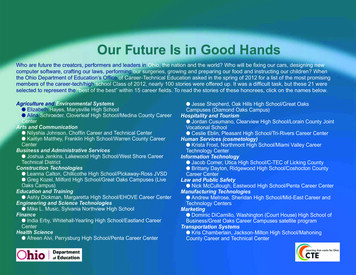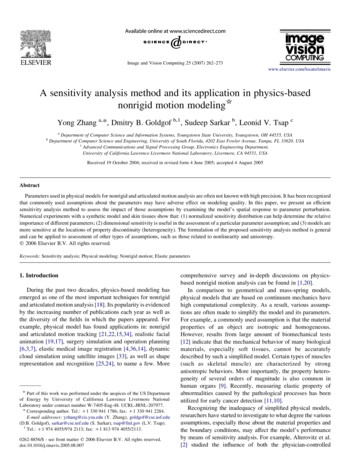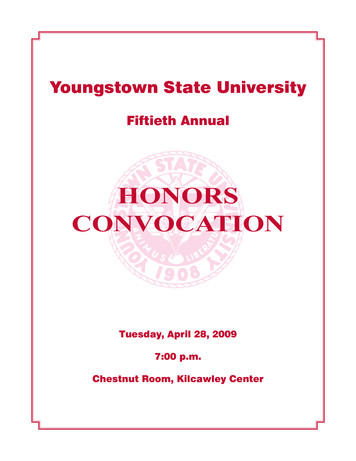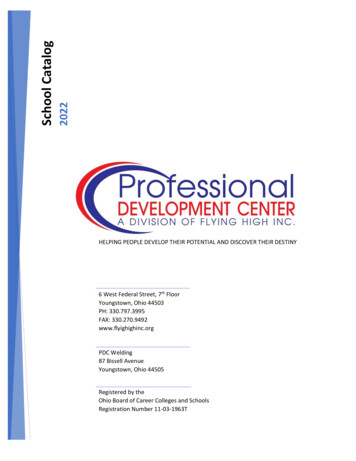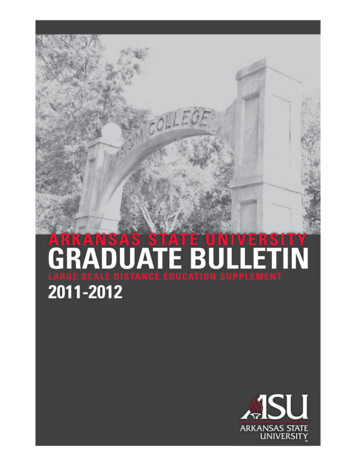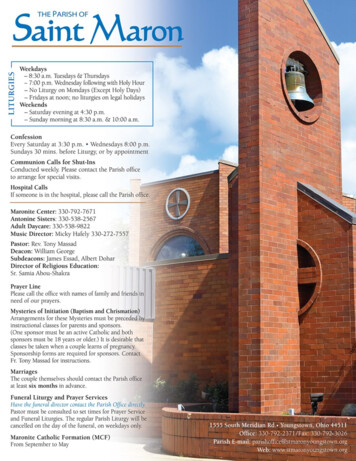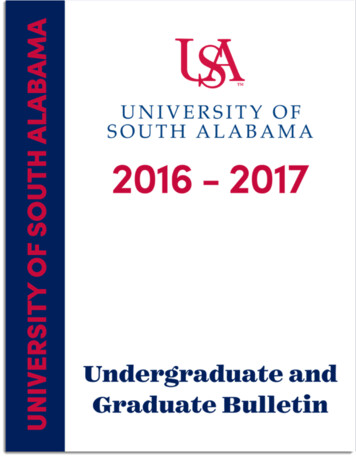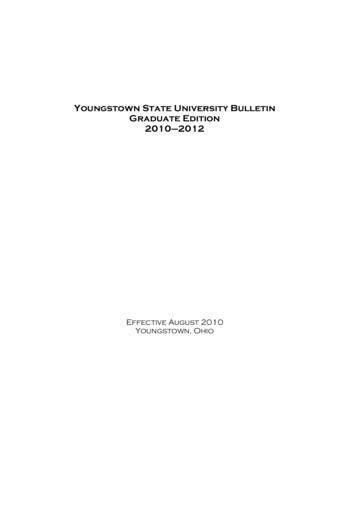
Transcription
Youngstown State University BulletinGraduate Edition2010–2012Effective August 2010Youngstown, Ohio
Youngstown State University reserves the right to change without notice any statement in this bulletinconcerning, but not limited to, rules, policies, tuition, fees, curricula, and courses.Youngstown State University is committed to a campus environment that values all individuals and groups, andto nondiscrimination and equal opportunity for all persons. No member of the University shall discriminate againstanother on the basis of sex, race, religion, color, age, national origin, sexual orientation, gender identity andor/expression, disability, or veteran status or any other basis protected by law. The University is also committed tothe principles of affirmative action and acts in accordance with state and federal laws.Inquiries should be addressed to Youngstown State University’s director of Equal Opportunity and Diversity,who is responsible for coordinating the University’s programs for compliance. Inquiries can be initiated in writingor by calling (330) 941-3370.Youngstown State UniversityGraduate BulletinVolume 77Issue 1 (2010–2011)EFFECTIVE AUGUST 2010School of Graduate Studies and ResearchYoungstown State UniversityOne University PlazaYoungstown, OH 44555
ContentsOhio Board of Regents, YSU Board of Trustees, and Executive OfficersAcademic Calendar 2010–2011General InformationResearch at YSUThe School of Graduate Studies and ResearchStudent Fees, Charges, and FinesState Residency StatusFinancial AssistanceCourse Numbering System, Abbreviations, and Reference MarksGraduate ProgramsDoctor of Education in Educational LeadershipDoctor of Physical TherapyMaster of Arts in American StudiesMaster of Arts in Art EducationMaster of Arts in EconomicsMaster of Arts in EnglishMaster of Arts in Financial EconomicsMaster of Arts in HistoryMaster of Business AdministrationMaster of Computing and Information SystemsMaster of Fine Arts in Creative WritingMaster of Health and Human ServicesMaster of MusicMaster of Public HealthMaster of Science in Applied Behavior AnalysisMaster of Science in BiologyMaster of Science in ChemistryMaster of Science in Criminal JusticeMaster of Science in Environmental StudiesMaster of Science in MathematicsMaster of Science in Education—CounselingMaster of Science in Education—Educational AdministrationMaster of Science in Education—Educational TechnologyMaster of Science in Education—Special EducationMaster of Science in Education—Teacher EducationMaster of Science in EngineeringMaster of Science in NursingMaster of Social WorkGraduate CertificatesAutism Spectrum and Related DisabilitiesBioethicsEnterprise Resource PlanningEnvironmental StudiesHealth Care ManagementLiterature for Children and Young AdultsNurse EducationProfessional Writing and EditingTeaching English to Speakers of Other Languages (TESOL)Teaching of WritingWorking-Class StudiesCoursesUniversity PoliciesGraduate 52153154155157158159160161162163164242244257
4Youngstown State University Bulletin, Graduate Edition 2010-2012Ohio Board of RegentsPatricia A. AckermanDonna M. AlvaradoBruce R. BeeghlyTimothy M. BurkeBonnie K. MilenthalLana Z. MoreskyJames F. Patterson, Vice ChairWalter A. Reiling, SecretaryJames M. Tuschman, ChairRep. Brian Williams (ex officio)Sen. Gary Cates (ex officio)Eric D. Fingerhut, ChancellorYoungstown State University Board of TrusteesMillicent S. CountsDelores E. CrawfordLarry D. DeJaneSudershan Garg, Vice ChairpersonJohn R. JakubekHarry MeshelLeonard D. SchiavoneScott R. Schulick, ChairpersonCarole S. WeimerFranklin S. Bennett, Jr., SecretaryStudent Trustees: Lyndsie A. Hall and Ryan A. MeditzExecutive OfficersCynthia E. Anderson, Ed.D., PresidentIkram Khawaja, Ph.D., Provost and Vice President for Academic AffairsJack Fahey, M.A., Interim Vice President for Student AffairsEugene P. Grilli, M.B.A., Vice President for Finance and AdministrationRichard Marsico, B.S., Interim Chief Technology OfficerSchool of Graduate Studies and ResearchCoffelt HallTelephone: (330) 941-3091Fax: (330) 941-1580graduateschool@cc.ysu.eduPeter J. Kasvinsky, Ph.D., Associate Provost for Research and DeanUndergraduate Academic AdministrationShearle Furnish, Ph.D., Dean, College of Liberal Arts and Social SciencesBetty Jo Licata, Ph.D., Dean, Williamson College of Business AdministrationMary Lou DiPillo, Ph.D., Interim Dean, Beeghly College of EducationBryan DePoy, D.M., Dean, College of Fine and Performing ArtsJoseph L. Mosca, Ph.D., Dean, Bitonte College of Health and Human ServicesMartin A. Abraham, Ph.D., Dean, College of Science, Technology, Engineering, and Mathematics
Youngstown State University Bulletin, Graduate Edition 2010-20125Academic Calendar 2010–2011Fall 2010July 15Aug. 20Thurs.Fri.Aug. 23Aug. 30Sept. 6Sept. 10Oct. 28Nov. 11Nov. 25Nov. 26Nov. 29Dec. . 12Sun.Last day to apply for graduate admission*Open registration for current, reactivated former, transfer, transient, andgraduate students endsall term beginsLast day to add coursesUniversity closed—legal holiday (Labor Day)Last day to apply for fall graduationLast day to withdraw with a grade of WUniversity closed—legal holiday (Veteran’s Day)University closed—legal holiday (Thanksgiving)University closed—legal holiday (Columbus Day observed)Thanksgiving academic break endsFinal examinations beginDeadline to submit theses to the School of Graduate Studies and ResearchFall term endsFall commencementSpring 2011Nov. 22Mon.Dec. 15Dec. 24Dec. 27Dec. 31Jan. 14Wed.Fri.Mon.Fri.Fri.Jan. 17Jan. 18Jan. 25Feb. 4Mar. 14Mar. 20Mar. 31May 9Mon.Tues.Tues.Fri.Mon.Sun.Thurs.Mon.May 15May 21Sun.Sat.Open registration for current, reactivated former, transfer, transient, andgraduate students beginsLast day to apply for graduate admission*University closed—legal holiday (Christmas Day)University closed—legal holiday (President’s Day observed)University closed—legal holiday (New Year’s Day)Open registration for current, reactivated former, transfer, transient, andgraduate students endsUniversity closed—legal holiday (Martin Luther King Day)Spring term beginsLast day to add coursesLast day to apply for spring graduationSpring break beginsSpring break endsLast day to withdraw with a grade of WFinal examinations beginDeadline to submit theses to the School of Graduate Studies and ResearchSpring term endsSpring commencementSummer 2011*Apr. 8Fri.Apr. 15May 20Fri.Fri.May 23May 30May 31June 10June 16June 20June 27Mon.Mon.Tues.Fri.Thurs.Mon.Mon.Open registration for current, reactivated former, transient, and graduatestudents beginsLast day to apply for graduate admission*Open registration for current, reactivated former, transient, and graduatestudents endsFull term and first six-week term beginUniversity closed—legal holiday (Memorial Day)Last day to add courses for full term and first six-week termLast day to apply for summer graduationLast day to withdraw with a grade of W for first six-week termMiddle six-week term beginsLast day to add courses for middle six-week termCertain programs may have earlier deadlines.
6Youngstown State University Bulletin, Graduate Edition 2010-2012July 3Sun.July 4July 5July 12July 14July 28July 31Aug. 8Aug. 14Mon.Tues.Tues.Thurs.Thurs.Sun.Mon.Sun.Aug. 20Sat.First six-week term ends (final examinations are given during the lastscheduled class period)University closed—legal holiday (Independence Day)Second six-week term beginsLast day to add courses for second six-week termLast day to withdraw with a grade of W for middle six-week termLast day to withdraw with a grade of W for second six-week termMiddle six-week term endsDeadline to submit theses to the School of Graduate Studies and ResearchFull term and second six-week term end (final examinations are givenduring the last scheduled class period)Summer commencementFall 2011*July 15Aug. 26Fri.Fri.Aug. 29Sept. 5Sept. 6Sept. 16Nov. 3Nov. 11Nov. 24Nov. 25Nov. 28Dec. . 18Sun.Last day to apply for graduate admission*Open registration for current, reactivated former, transfer, transient, andgraduate students endsFall term beginsUniversity closed—legal holiday (Labor Day)Last day to add coursesLast day to apply for fall graduationLast day to withdraw with a grade of WUniversity closed—legal holiday (Veteran’s Day)University closed—legal holiday (Thanksgiving)University closed—legal holiday (Columbus Day observed)Thanksgiving academic break endsFinal examinations beginDeadline to submit theses to the School of Graduate Studies and ResearchFall term endsFall commencementCertain programs may have earlier deadlines.
Youngstown State University Bulletin, Graduate Edition 2010-20127General InformationDesigning Our Future in the 21st Century:The Centennial Strategic Plan of Youngstown State UniversityMission StatementYoungstown State University provides open access to high-quality education through a broad range of affordablecertificate, associate, baccalaureate, and graduate programs.The University is dedicated to outstanding teaching, scholarship, and service, and to forging connections among these three interactivecomponents of its mission; fostering student-faculty relationships that enrich teaching and learning, develop scholarship, andencourage public service; promoting diversity and an understanding of global perspectives; and advancing the intellectual, cultural, and economic life of the state and region.Defining Principles for the Strategic Planning ProcessYSU’s strategic plan represents a shared vision of what YSU seeks to become and specific strategies to achieve it.An open and continuous endeavor, the strategic planning process is designed to guide a dynamic University capableof responding in a timely fashion to new opportunities and changing internal and external circumstances. The planreflects campus- and community-wide collaboration and discussion.The Strategic Plan will: represent YSU’s commitment to provide all students open access to a high-quality education; state how YSU interacts with and responds to community needs and opportunities; guide development of annual action plans and budgets, connecting human and other resources toidentified priorities and supporting initiatives; and guide the University in identifying programs and activities that will be initiated, continued, anddiscontinued;Core ValuesWe—the faculty, staff, administrators, and students of Youngstown State University—hold the following valuesessential to achieving the University’s mission.Centrality of Students. We are a student-centered institution committed to the education, development, wellbeing, and success of students of all ages and from all walks of life. In concert with our mission to help studentsgrow intellectually, we strive to foster their personal, social, emotional, and career growth, as well as their capacitiesfor lifelong learning, civic responsibility, and leadership.Excellence and Innovation. We value excellence and innovation inside the classroom and out. Thus, we striveto offer outstanding academic programs; to foster intellectual inquiry, exploration, and discovery; to transcendtraditional boundaries; to apply and perfect knowledge; to encourage creativity; to provide effective tools,technologies, and facilities for learning; and to excel in research and scholarly activity, including the “scholarship ofteaching and learning”—an area of research that explores how individuals teach and learn.Integrity/Human Dignity. As a campus community, we expect all conduct to be rooted in integrity, mutualrespect, and civility. We value ethical behavior in scholarly and other endeavors; believe in the dignity and worth ofall people; strive to foster an appreciation of, and respect for, differences among the human race; and celebrate thediversity that enriches the University and the world.
8Youngstown State University Bulletin, Graduate Edition 2010-2012Collegiality and Public Engagement. As scholar-citizens of many extended and interconnected communities,we pledge to work collegially and cooperatively to enrich the cultural environment; establish productivepartnerships; provide responsible leadership; address community and workforce needs; and bring about the greatergood of the collective whole—be it the University, the Mahoning Valley, the state, the region, or beyond.Vision StatementYoungstown State University will become a national model for student-centered comprehensive urbanuniversities, transforming its students into successful professionals, scholars, citizens, and leaders.Building upon its tradition of developing the body, mind, and spirit, YSU will provide a full range of services andamenities to meet the needs of residential, commuter, and offsite students.In partnership with schools and the corporate, public, and nonprofit communities, YSU will promote diversityand excellence in teaching, research, and service to increase the educational attainment, economic prosperity, andenvironmental vitality of the region.The University will be a center for intellectual and cultural activity and a catalyst for public engagement.Priority StatementsCritical Issue 1: Enrollment/Retention. YSU will build enrollment strategically and manage it effectively.Critical Issue 2: Programs/Teaching, Learning, and Research. YSU will promote excellence in teaching,learning, service, and research—and prepare students to undertake civic and leadership responsibilities—throughprograms and educational experiences that meet student and workforce needs.Critical Issue 3: Financial Resources. YSU will manage resources efficiently and strategically, leverage themeffectively, and develop additional resources to fulfill its mission.Critical Issue 4: Image/Market. YSU will develop and communicate a positive, shared institutional identity andmarket its strengths and successes aggressively.Critical Issue 5: Student Services/Alumni Relations. YSU will provide the range of student services necessaryfor a student-centered University to attract, support, retain, advance, and graduate students. YSU will also maintainongoing and lifelong relationships with its alumni.Critical Issue 6: Diversity. YSU will provide a climate of respect for all people. Its students, faculty, staff, andcourse content will increasingly reflect the diversity of the community, the nation, and the world.Critical Issue 7: Technology. YSU will pursue an integrated approach in using technology to meet the academic,research, student-services, and administrative goals of the University.Critical Issue 8: Community Engagement. YSU will undertake community partnerships to serve and addressthe cultural, intellectual, educational, social, and economic needs of the region.Critical Issue 9: Human Resources Development. YSU will further develop a competent, motivated, diverse,and competitively paid workforce committed to carrying out the mission of the University.Critical Issue 10: Facilities/University Neighborhood. YSU will develop and maintain a safe, attractive,convenient, and functional physical plant responsive to the present and future needs of students, staff, alumni, andthe community. The University will work with the community to enhance the safety, aesthetics, and vitality of thecampus periphery and surrounding neighborhood.HistoryYoungstown State University is in downtown Youngstown, an industrial center in northeastern Ohio midwaybetween Pittsburgh and Cleveland.Youngstown State University traces its beginnings to a commercial law course offered by the Young Men’sChristian Association in 1908. The YMCA had offered high school level and vocational courses since 1888, butwanted to meet the college-level needs of area residents in a society undergoing rapid industrialization andurbanization. The “Y” offered courses on law, business and engineering, and in 1910, even instituted a School of Lawthat granted no degree, but prepared students to take the bar exam. In 1916, the YMCA incorporated all of its
Youngstown State University Bulletin, Graduate Edition 2010-20129educational work under the Youngstown Association School.By the early 1920s, the Ohio Board of Education granted the School of Law the power to confer the Bachelor ofScience in Law degree, and in 1924 the School of Commerce and Finance the right to confer the bachelor’s degree incommercial science. The YMCA also offered courses to prepare teachers for certification, a program that evolved by1927 into a separate school named Youngstown College and recognized by the State Department of Education.Throughout the 1920s, the schools of law and commercial science were called the Youngstown Institute ofTechnology, which began a move from downtown to the present location with the purchase of several mansionsowned by the Wicks.In 1931, the YMCA constructed its first building, the present-day Jones Hall, and appointed Howard Jones as theeducational director. By the mid-1930s, the Board of Directors decided to incorporate with the official name ofYoungstown College separate from the other “Y” educational efforts; they appointed Howard Jones as the firstpresident, a position he held until 1966.In 1944, the trustees of the Young Men’s Christian Association transferred control of the institution to themembers of the Corporation of Youngstown College, and in 1955 the corporation was rechartered as TheYoungstown University. The University joined the Ohio system of higher education in September 1967 asYoungstown State University.Dana’s Musical Institute, founded in nearby Warren in 1869, became Dana's Musical Institute of YoungstownCollege in 1941. In 1946, the Engineering Department, organized several years before, became the William RayenSchool of Engineering; two years later, the Business Administration Department became the School of BusinessAdministration; and in 1981 the school name was changed to the Warren P. Williamson, Jr. School of BusinessAdministration. In 1960, the Education Department became the School of Education.The Graduate School and College of Applied Science and Technology were created in 1968, and, in 1974, theCollege of Fine and Performing Arts was established.In 1972, Youngstown State University, with the University of Akron and Kent State University formed aconsortium to sponsor the Northeastern Universities College of Medicine, which enrolled its first students in 1975.In 1991 the engineering technology departments separated from CAST and joined the new College of Engineeringand Technology; the remaining departments formed the new College of Health and Human Services.In 2007, the Rayen College of Engineering and Technology incorporated the science and mathematicsdepartments from the College of Arts and Sciences. This reorganization linked science, technology, engineering, andmathematics on one hand, and the humanities and social sciences on the other.Youngstown State University now consists of the School of Graduate Studies and Research and sixundergraduate colleges: the Williamson College of Business Administration; the Beeghly College of Education; theCollege of Fine and Performing Arts; the Bitonte College of Health and Human Services; the College of Liberal Artsand Social Sciences; and the College of Science, Technology, Engineering, and Mathematics. Degrees offered rangefrom the associate, bachelor’s, and master’s to a doctorate in educational leadership and the Doctor of PhysicalTherapy.A coeducational institution, YSU had an enrollment of 300 students in 1930, which grew to 2,000 in the 1940s,tripled by the 1950s, reached 10,000 in the mid-sixties, and totaled more than 15,000 in 1986. As of fall 2009,undergraduate enrollment stood at 14,682 and graduate enrollment at 1,305.AccreditationYoungstown State University is accredited by the Higher Learning Commission and a member of the NorthCentral Association. Please visit http://www.ncahlc.org/ or call (312) 263-0456 for additional information.Programs within the individual colleges may be further accredited by their respective professional bodies. Thoseaccreditations are listed in the program descriptions.AssessmentYSU is committed to providing an effective assessment process that supports student learning, improvesacademic programs, and enables YSU to provide exemplary services to all constituents. To sustain the University’scontinuous improvement on all levels, the Office of Assessment collaborates to design and coordinate regular andongoing assessment of student learning outcomes with each academic department in the six colleges for each degreeprogram, with the Office of General Education for the general education program, and with non-academic units inongoing efforts to document student success. A systematic feedback loop also enables both academic and non-
10Youngstown State University Bulletin, Graduate Edition 2010-2012academic units to share information about student learning with students, faculty, staff and appropriateorganizations. All information is shared in aggregate form only, and confidentiality of individual students issafeguarded. If assessment information is shared beyond the internal efforts of program improvement oraccreditation, departments and the Office of Assessment abide by the Human Subjects Research Committeeguidelines at YSU.Degrees GrantedYSU grants the degrees of Doctor of Education, Doctor of Physical Therapy, Master of Arts, Master of BusinessAdministration, Master of Computing and Information Systems, Master of Fine Arts, Master of Health and HumanServices, Master of Music, Master of Public Health, Master of Science, Master of Science in Education, Master ofScience in Engineering, Master of Science in Nursing, Master of Social Work, Bachelor of Arts, Bachelor ofEngineering, Bachelor of Fine Arts, Bachelor of General Studies, Bachelor of Music, Bachelor of Science, Bachelor ofScience in Applied Science, Bachelor of Science in Business Administration, Bachelor of Science in Education,Bachelor of Science in Nursing, Bachelor of Science in Respiratory Care, and Bachelor of Social Work. A broadselection of two-year programs leads to the degrees of Associate of Arts, Associate of Applied Science, Associate ofLabor Studies, and Associate of Technical Study.Equal Opportunity and Affirmation Action PolicyYoungstown State University is committed to a campus environment that values all individuals and groups, andto nondiscrimination and equal opportunity for all persons without regard to sex, race, religion, color, age, nationalorigin, sexual orientation, gender identity and/or expression, handicap/disability, or identification as a disabledand/or Vietnam Era veteran. The University is also committed to the principles of affirmative action and acts inaccordance with state and federal laws.Although the ultimate responsibility for maintaining a viable and effective affirmative action program rests withthe president of the University, the key role in its execution is delegated to the director of Equal Opportunity andDiversity, who periodically reviews the program, discusses grievances and charges of discrimination, if any, andmakes recommendations toward the program’s effectiveness.The University uses all normal means of communication to make known its policies of equal opportunity andaffirmative action.The CampusCampus DevelopmentDuring its earlier years, the institution had a number of homes. Starting in the old Central YMCA building, itoccupied various sites on Wick Avenue until the completion of Jones Hall in 1931. Additional buildings have beenconstructed and nearby properties converted to University use, so that today the campus extends through most ofan area five blocks long and four blocks wide, covering 150 acres. The University also has 118.4 acres in HartfordTownship.All-Sports Complex, Stambaugh StadiumLocated on an 18-acre site adjacent to Beeghly Physical Education Center, the All-Sports Complex includesArnold D. Stambaugh Stadium and Beede Field, an artificial-turf sports field for football and soccer, with seating formore than 20,630 spectators, officials’ dressing rooms, varsity athletic offices, classrooms, racquetball courts,gymnasiums, weight rooms, and facilities for various other health and physical education activities.Atop the stadium and overlooking the city of Youngstown is the DeBartolo Stadium Club. The club providesmeeting and dinner/party seating for 220 people and is available to campus and community organizations orindividuals. For reservation information, please call the Office of Alumni and Events Management at (330) 941-3497.The complex also includes an all-weather 400-meter track with 1500 bleacher seats, facilities for all other trackand field events, outdoor courts for basketball, and ten hard-surfaced and lighted tennis courts.Other Sports Facilities. Currently, in addition to Beeghly Center and the All-Sports Complex, the physicaleducation, athletic, and intramural programs use the athletic fields and well-equipped sports centers in Mill Creek
Youngstown State University Bulletin, Graduate Edition 2010-201211Park; Evans Field, Pemberton Park, and Cafaro Field for baseball; Harrison Field in Smoky Hollow for softball; andfor other activities, the Holiday Bowl in Struthers, the Henry Stambaugh Golf Course on Youngstown’s North Side,and the par 3 golf course in Mill Creek Park.Andrews Recreation and Wellness CenterYSU’s newest addition to campus life is the state-of-the-art Andrews Recreation and Wellness Center. The70,000 sq. ft. facility includes a 12,000 sq. ft. cardio fitness and free weight area, offering over 70 pieces of cardiofitness equipment, including treadmills, ellipticals, a variety of cycles, steppers, and rowers, as well as a ten-stationcardio theater, which accommodates 40 machines. The free weight area holds 24 selectorized weight-trainingmachines and a combination of 40 plate-loaded and free weight stations.In addition, the Center holds an 18,500 sq. ft. sports forum, which includes four multipurpose courts withintended use for basketball, volleyball, badminton, and a host of other activities. The facility also boasts a 3,200 sq.ft. aerobics and multipurpose gymnasium designed to accommodate classes taught by certified instructors,specifically to condition, sculpt, and tone. A meditation center provides a quiet space for students, faculty, and staffto reflect, relax, and contemplate.The Center also offers a wellness component designed to promote healthy lifestyle choices throughcomprehensive programming in the areas of fitness, nutrition, and mental and spiritual health.Also housed in YSU’s new student recreation and wellness center is a climbing wall, towering at 53 ft., making itone of the tallest climbing walls in the state of Ohio. Activities for this area include climbing, rappelling, andbouldering. Our professionally trained staff provides a short, mandatory class to prepare patrons for climbing.Only a currently validated YSU ID is required for entrance to the new Andrews Student Recreation andWellness Center. All programs and activities offered in the Center are available to the YSU student population at noadditional cost. The hours of operation are Monday through Thursday, 6:30 a.m. to 10:30 p.m., Friday 6:30 a.m. to9:00 p.m., and Saturday and Sunday, 10:00 a.m. to 6:00 p.m.Beeghly HallThe four-story, 96,600 square foot Beeghly Hall opened in the fall of 1998 to serve as the College of Educationbuilding.On the main floor are the main north/south entrance and access, dean’s suite, Wilcox Curriculum ResourceCenter, Child Study Center, and the 400-seat multipurpose and multimedia McKay Auditorium.The new Beeghly College of Education building includes the following: An interactive distance-learning classroomA classroom of the futureThe Center for Teaching and Learning TechnologyMacintosh- and Windows-based computer labsThe Curriculum Resource CenterA counseling clinicA child-study centerTesting OfficeBeeghly Physical Education CenterIn this building, first occupied in 1972, are the Department of Human Performance and Exercise Science and theOlympic sports offices and facilities. In addition to a gymnasium with seating for over 6,900 spectators and anolympic-size swimming pool, it contains faculty offices; 12 classrooms; including laboratories for research andkinesiology; physical education for handicapped students; a dance studio, a rifle range, and a fitness center.Bliss HallHousing the College of Fine and Performing Arts, Bliss Hall, completed in 1977, was named in memory ofWilliam E. Bliss, a prominent area industrialist. Bliss Hall’s facilities include the 390-seat Ford Theater, named forthe Ford family, and the 220-seat Bliss Recital Hall. Facilities for the Art Department include a photography studiowith 32 enlargers; a metals studio; fully equipped drawing, printmaking, sculpture, and painting studios; two Mac-
12Youngstown State University Bulletin, Graduate Edition 2010-2012based graphic design laboratories; ceramics studios with gas, electric, raku and salt kilns; a complete shop withheavy equipment for working in three-dimensional design; a foundry and metal fabrication area; woodshop; artgallery; a 3D visualization laboratory and an exterior work court. Facilities within the Communication area includea video production enterprise, and the Bliss Hall TV studio, where “Homework Express,” an after-school televisionprogram, is aired live two days a week. Facilities for the Dana School of Music include 80 music practice roomsequipped with Steinway studio or grand pianos; a Schlicker performance organ and two Flentrop practice organs;30 faculty office/studios; various classroom and rehearsal spaces; four music libraries; two media labs; and aprofessional recording studio. Facilities within the Theater and Dance area include complete costume and sce
the principles of affirmative action and acts in accordance with state and federal laws. Inquiries should be addressed to Youngstown State University's director of Equal Opportunity and Diversity, who is responsible for coordinating the University's programs for compliance. Inquiries can be initiated in writing or by calling (330) 941-3370.
